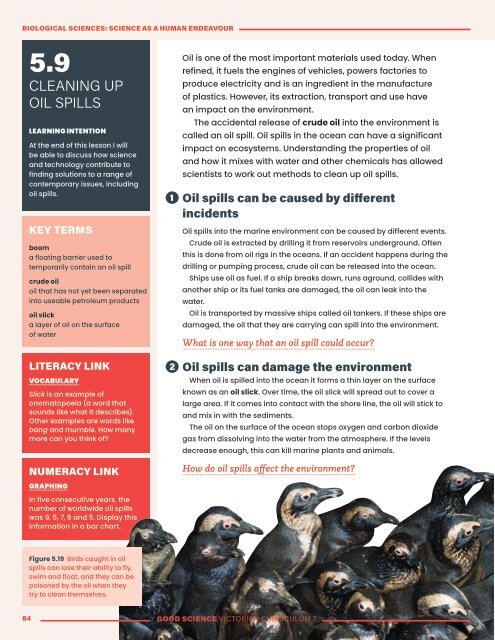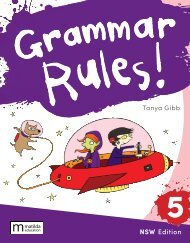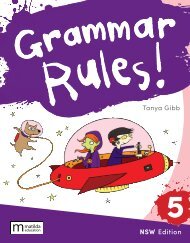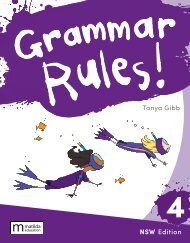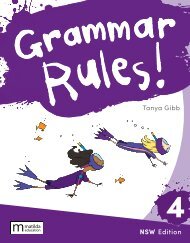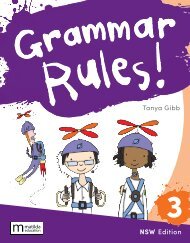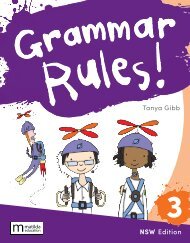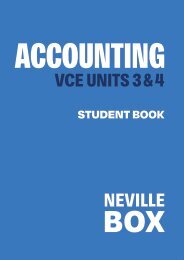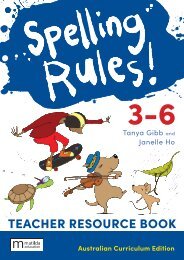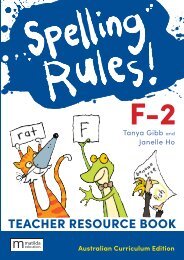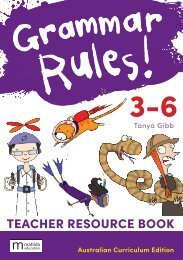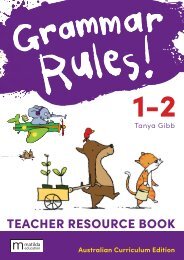Good Science Victorian Curriculum Year 7
Digital sample of Matilda's newest publication, Good Science Victorian Curriculum Year, authored by Emma Craven and Aaron Elias. For more information visit www.matildaeducation.com.au or email Katrina Tucker, katrinatucker@matildaed.com.au
Digital sample of Matilda's newest publication, Good Science Victorian Curriculum Year, authored by Emma Craven and Aaron Elias. For more information visit www.matildaeducation.com.au or email Katrina Tucker, katrinatucker@matildaed.com.au
You also want an ePaper? Increase the reach of your titles
YUMPU automatically turns print PDFs into web optimized ePapers that Google loves.
BIOLOGICAL SCIENCES: SCIENCE AS A HUMAN ENDEAVOUR<br />
5.9<br />
CLEANING UP<br />
OIL SPILLS<br />
LEARNING INTENTION<br />
At the end of this lesson I will<br />
be able to discuss how science<br />
and technology contribute to<br />
finding solutions to a range of<br />
contemporary issues, including<br />
oil spills.<br />
KEY TERMS<br />
boom<br />
a floating barrier used to<br />
temporarily contain an oil spill<br />
crude oil<br />
oil that has not yet been separated<br />
into useable petroleum products<br />
oil slick<br />
a layer of oil on the surface<br />
of water<br />
LITERACY LINK<br />
VOCABULARY<br />
Slick is an example of<br />
onomatopoeia (a word that<br />
sounds like what it describes).<br />
Other examples are words like<br />
bang and mumble. How many<br />
more can you think of?<br />
NUMERACY LINK<br />
GRAPHING<br />
In five consecutive years, the<br />
number of worldwide oil spills<br />
was 9, 5, 7, 8 and 5. Display this<br />
information in a bar chart.<br />
1<br />
2<br />
Oil is one of the most important materials used today. When<br />
refined, it fuels the engines of vehicles, powers factories to<br />
produce electricity and is an ingredient in the manufacture<br />
of plastics. However, its extraction, transport and use have<br />
an impact on the environment.<br />
The accidental release of crude oil into the environment is<br />
called an oil spill. Oil spills in the ocean can have a significant<br />
impact on ecosystems. Understanding the properties of oil<br />
and how it mixes with water and other chemicals has allowed<br />
scientists to work out methods to clean up oil spills.<br />
Oil spills can be caused by different<br />
incidents<br />
Oil spills into the marine environment can be caused by different events.<br />
Crude oil is extracted by drilling it from reservoirs underground. Often<br />
this is done from oil rigs in the oceans. If an accident happens during the<br />
drilling or pumping process, crude oil can be released into the ocean.<br />
Ships use oil as fuel. If a ship breaks down, runs aground, collides with<br />
another ship or its fuel tanks are damaged, the oil can leak into the<br />
water.<br />
Oil is transported by massive ships called oil tankers. If these ships are<br />
damaged, the oil that they are carrying can spill into the environment.<br />
What is one way that an oil spill could occur?<br />
Oil spills can damage the environment<br />
When oil is spilled into the ocean it forms a thin layer on the surface<br />
known as an oil slick. Over time, the oil slick will spread out to cover a<br />
large area. If it comes into contact with the shore line, the oil will stick to<br />
and mix in with the sediments.<br />
The oil on the surface of the ocean stops oxygen and carbon dioxide<br />
gas from dissolving into the water from the atmosphere. If the levels<br />
decrease enough, this can kill marine plants and animals.<br />
How do oil spills affect the environment?<br />
Figure 5.19 Birds caught in oil<br />
spills can lose their ability to fly,<br />
swim and float, and they can be<br />
poisoned by the oil when they<br />
try to clean themselves.<br />
84 GOOD SCIENCE VICTORIAN CURRICULUM 7


